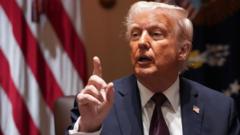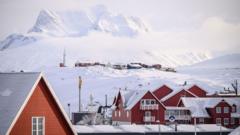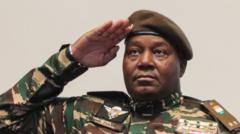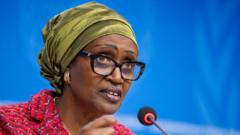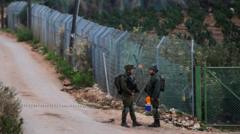The departure of Mali, Burkina Faso, and Niger from the Ecowas bloc raises questions about economic interdependence and security collaboration in a volatile Sahel region.
**Military Coups Prompt Withdrawal from Ecowas: Implications for West Africa**
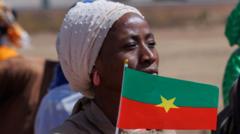
**Military Coups Prompt Withdrawal from Ecowas: Implications for West Africa**
Three military-led nations exit Ecowas as ties with the regional bloc sour, igniting discussions on sovereignty and regional stability.
In a significant geopolitical shift, three military-run nations—Mali, Burkina Faso, and Niger—have officially severed ties with the Economic Community of West African States (Ecowas), following a year marked by rising diplomatic tensions and mounting sanctions from the bloc. This withdrawal represents a critical challenge for Ecowas, a regional organization established in 1975, which has been pivotal in promoting political and economic stability in West Africa.
The tensions escalated after military coups swept through these nations, instigating a harsh response from Ecowas, which included sanctions and military intervention threats aimed at restoring democratic governance. The junta leaders in the three countries have voiced strong criticism of Ecowas, alleging that it is overly influenced by Western powers, and have instead shifted their alliance towards Russia.
What does this mean for the future of these nations? The juntas assert that their exit will enhance national sovereignty and remove foreign interferences. However, both local and international observers warn that the nations may face challenges outside the Ecowas framework. Being predominantly landlocked and economically reliant on their neighbors, Mali, Burkina Faso, and Niger risk significant downturns in trade and economic collaboration.
Despite this, Ecowas has stated it will continue to recognize the validity of identity documents issued within its territories and allow for the circulation of goods among its original member states. Analysts note that despite the separation, it is crucial for the departing states to keep their borders open, as closing them could lead to economic self-harm.
Security concerns in the Sahel are also paramount. Frequent terrorist activities in the region have resulted in extreme casualties, and Ecowas has historically been instrumental in combating these security threats. There are fears that the disbanding of this cooperative relationship may leave the states vulnerable to further extremist insurgencies.
The ramifications of Ecowas’s loss are substantial; they comprise about 76 million citizens and significant portions of West Africa’s territory. Experts have expressed that the withdrawal may lead to a decline in both collaboration against security challenges and the bloc’s legitimacy.
Residents within the withdrawing states exhibit mixed reactions. Celebrations ignited in response to the departure amidst calls for autonomy, while others express concern over potential future economic implications. As the region embarks on this uncertain path, the potential for either increased integration or isolation remains to be seen.
Looking ahead, Ecowas has provided the three states with a six-month window for reconsideration of their withdrawal. As part of their new alignment, the departing states are launching new passports under the Alliance of Sahel States (AES) and intend to establish a shared military force to confront ongoing jihadist threats. Time will tell how this new alliance will reshape the dynamics in West African politics and security.
The tensions escalated after military coups swept through these nations, instigating a harsh response from Ecowas, which included sanctions and military intervention threats aimed at restoring democratic governance. The junta leaders in the three countries have voiced strong criticism of Ecowas, alleging that it is overly influenced by Western powers, and have instead shifted their alliance towards Russia.
What does this mean for the future of these nations? The juntas assert that their exit will enhance national sovereignty and remove foreign interferences. However, both local and international observers warn that the nations may face challenges outside the Ecowas framework. Being predominantly landlocked and economically reliant on their neighbors, Mali, Burkina Faso, and Niger risk significant downturns in trade and economic collaboration.
Despite this, Ecowas has stated it will continue to recognize the validity of identity documents issued within its territories and allow for the circulation of goods among its original member states. Analysts note that despite the separation, it is crucial for the departing states to keep their borders open, as closing them could lead to economic self-harm.
Security concerns in the Sahel are also paramount. Frequent terrorist activities in the region have resulted in extreme casualties, and Ecowas has historically been instrumental in combating these security threats. There are fears that the disbanding of this cooperative relationship may leave the states vulnerable to further extremist insurgencies.
The ramifications of Ecowas’s loss are substantial; they comprise about 76 million citizens and significant portions of West Africa’s territory. Experts have expressed that the withdrawal may lead to a decline in both collaboration against security challenges and the bloc’s legitimacy.
Residents within the withdrawing states exhibit mixed reactions. Celebrations ignited in response to the departure amidst calls for autonomy, while others express concern over potential future economic implications. As the region embarks on this uncertain path, the potential for either increased integration or isolation remains to be seen.
Looking ahead, Ecowas has provided the three states with a six-month window for reconsideration of their withdrawal. As part of their new alignment, the departing states are launching new passports under the Alliance of Sahel States (AES) and intend to establish a shared military force to confront ongoing jihadist threats. Time will tell how this new alliance will reshape the dynamics in West African politics and security.










